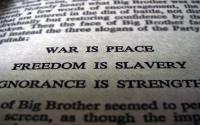Published on Wednesday, January 26, 2005 by Knight RidderFrank Davies
Alberto Gonzales has asserted to the Senate committee weighing his nomination to be attorney general that there's a legal rationale for harsh treatment of foreign prisoners by U.S. forces.
In more than 200 pages of written responses to members of the Senate Judiciary Committee, who plan to vote Wednesday on his nomination, Gonzales told senators that laws and treaties prohibit torture by any U.S. agent without exception.
But he said the Convention Against Torture treaty, as ratified by the Senate, doesn't prohibit the use of "cruel, inhuman or degrading" tactics on non-U.S. citizens who are captured abroad, in Iraq or elsewhere.
Gonzales, White House counsel and a close Bush adviser, described recent reports of prisoner abuse as "shocking and deeply troubling." But he refused to answer questions from senators about whether interrogation tactics witnessed by FBI agents were unlawful.
He warned that any public discussion about interrogation tactics would help al-Qaida terrorists by giving them "a road map" of what to expect when captured.
He also said the administration was conducting a comprehensive legal review of all practices and that the Justice Department, so far, had concluded that the tactics were lawful.
The committee, with 10 Republican and eight Democrats, is expected to send Gonzales' nomination to the full Senate on Wednesday. He would replace Attorney General John Ashcroft, who bade farewell to the department Monday.
Several Democrats on the committee are leaning against Gonzales, saying he's been evasive and unwilling to consider that administration decisions in 2002 may have contributed to abuse by U.S. soldiers.
Sen. Patrick Leahy of Vermont, the committee's ranking Democrat, called Gonzales' written responses to senators' questions after his Jan. 6 hearing "vague, unresponsive or AWOL."
As he did at the hearing, Gonzales said President Bush had ordered that torture not be used by the U.S. military or the CIA. He used the definition of torture in U.S. statutes: an act "specifically intended to inflict severe physical or mental pain or suffering."
But he drew a distinction between U.S. anti-torture statutes and the international Convention Against Torture, which calls on nations to prevent acts of "cruel, inhuman or degrading treatment" that may fall short of torture.
When the Senate ratified the treaty, it defined such treatment as violations of the Fifth, Eighth and 14th Amendments. Because of that provision, Gonzales said, the Justice Department decided that the convention applies only to actions under U.S. jurisdiction, not "treatment with respect to aliens overseas."
He refused to be drawn into a discussion of tactics that might constitute torture. Sen. Edward Kennedy, D-Mass., asked him about reports from FBI agents, recently released, that some detainees were bound hand and foot to lie in their own urine and feces for 18 to 24 hours.
"I found those e-mails to be shocking and deeply troubling," Gonzales responded. "I do not think it would be appropriate for me to address reports of interrogation practices discussed in the press and attempt to analyze whether such reported practices are lawful."
Asked about a key 2002 Justice Department memo that narrowly defined torture as pain that led to organ failure or death, Gonzales said he couldn't recall if the CIA sought it or if he had asked the department to produce it.
He conceded that the memo from the department's Office of Legal Counsel, which was addressed to him, began, "You have asked for our office's view."
Cal Jillson, a constitutional scholar who's followed the careers of Gonzales and Bush since they were in Texas, said Gonzales was following basic Bush administration policy: Don't admit mistakes or re-evaluate decisions.
"They are very loath to reconsider actions in the wake of the Sept. 11 attacks," said Jillson, a professor at Southern Methodist University. "The message is, the president never approved of torture, but the question is, did you play with the definition so that almost nothing qualified as torture?"
Scott Silliman, a former Air Force lawyer who heads the Center on Law, Ethics and National Security at Duke University, said Gonzales made an important point about keeping some discussion classified. But he said recent reports of widespread abuses should require congressional oversight.
"With all the reports out now, and all the confusion and ambiguity over what is allowed, Congress has to find a way to deal with this," Silliman added, suggesting closed hearings to examine what's allowed and what isn't.
In a recent interview, Bush deflected a question about which interrogation methods he'd reviewed and approved, or whether he'd authorized the transfer of prisoners to countries that use torture.
"The only thing I issued was, don't torture. That's the policy of the government," he told a Knight Ridder reporter. "And we don't torture. And if there is torture, we will bring people to account."
http://www.commondreams.org/cgi-bin/print.cgi?file=/headlines05/0126-06.htm






